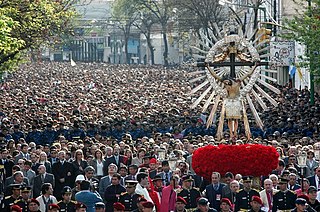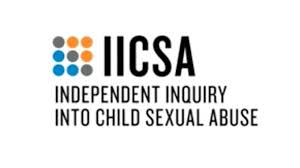Related Research Articles

Modern paganism, also known as contemporary paganism and neopaganism, is a term for a religion or a family of religions which is influenced by the various historical pre-Christian beliefs of pre-modern peoples in Europe and adjacent areas of North Africa and the Near East. Although they share similarities, contemporary pagan movements are diverse and as a result, they do not share a single set of beliefs, practices, or texts. Scholars of religion often characterise these traditions as new religious movements. Some academics who study the phenomenon treat it as a movement that is divided into different religions while others characterize it as a single religion of which different pagan faiths are denominations.

Religion is a range of social-cultural systems, including designated behaviors and practices, morals, beliefs, worldviews, texts, sanctified places, prophecies, ethics, or organizations, that generally relate humanity to supernatural, transcendental, and spiritual elements—although there is no scholarly consensus over what precisely constitutes a religion. Different religions may or may not contain various elements ranging from the divine, sacredness, faith, and a supernatural being or beings.
Secularism is the principle of seeking to conduct human affairs based on naturalistic considerations, uninvolved with religion.

Secular humanism is a philosophy, belief system or life stance that embraces human reason, secular ethics, and philosophical naturalism while specifically rejecting religious dogma, supernaturalism, and superstition as the basis of morality and decision making.

A worldview or a world-view or Weltanschauung is the fundamental cognitive orientation of an individual or society encompassing the whole of the individual's or society's knowledge, culture, and point of view. A worldview can include natural philosophy; fundamental, existential, and normative postulates; or themes, values, emotions, and ethics.
Irreligion is the neglect or active rejection of religion and, depending on the definition, a simple absence of religion.

Peter Ludwig Berger was an Austrian-born American sociologist and Protestant theologian. Berger became known for his work in the sociology of knowledge, the sociology of religion, study of modernization, and theoretical contributions to sociological theory.

Interfaith dialogue refers to cooperative, constructive, and positive interaction between people of different religious traditions and/or spiritual or humanistic beliefs, at both the individual and institutional levels. It is distinct from syncretism or alternative religion, in that dialogue often involves promoting understanding between different religions or beliefs to increase acceptance of others, rather than to synthesize new beliefs.

Religion in Russia is diverse, with Christianity, especially Russian Orthodoxy, being the most widely professed faith, but with significant minorities of non-religious people and adherents of other faiths. A 1997 law on religion recognises the right to freedom of conscience and creed to all the citizenry, the spiritual contribution of Orthodox Christianity to the history of Russia, and respect to "Christianity, Islam, Buddhism, Judaism and other religions and creeds which constitute an inseparable part of the historical heritage of Russia's peoples", including ethnic religions or paganism, either preserved, or revived. According to the law, any religious organisation may be recognised as "traditional", if it was already in existence before 1982, and each newly founded religious group has to provide its credentials and re-register yearly for fifteen years, and, in the meantime until eventual recognition, stay without rights.
A person's life stance, or lifestance, is their relation with what they accept as being of ultimate importance. It involves the presuppositions and theories upon which such a stance could be made, a belief system, and a commitment to potentials working it out in one's life.
Is Religion Dangerous? is a book by Keith Ward examining the questions: "Is religion dangerous? Does it do more harm than good? Is it a force for evil?" It was first published in 2006. Looking at the evidence from history, philosophy, sociology and psychology, Ward focuses on the main question at issue: does religion do more harm than good? He begins by examining the key area of religion and violence and goes on to assess the allegations of irrationality and immorality, before exploring the good religion has done over the centuries. He suggests that without religion the human race would be considerably worse off and there would be little hope for the future.
Theos is a Christian religion and society think tank researching the relationship between religion, politics and society in the contemporary world. Theos aims to impact opinion around issues of faith and belief in society through research, publications, media engagement, podcasts, animated videos, and events such as debates, seminars and lectures. Theos is headquartered in the United Kingdom in Westminster, London.
Moral syncretism consists of the attempt to reconcile disparate or contradictory moral beliefs, often while melding the ethical practices of various schools of thought.

Islam is the state religion of Malaysia, as per Article 3 of the Constitution. Meanwhile, other religions can be practised by non-Malay citizens of the country. In addition, per Article 160, one must be Muslim to be considered Malay. As of the 2020 Population and Housing Census, 63.5 percent of the population practices Islam; 18.7 percent Buddhism; 9.1 percent Christianity; 6.1 percent Hinduism; and 2.7 percent other religion or gave no information. The remainder is accounted for by other faiths, including Animism, Folk religion, Sikhism, Baháʼí Faith and other belief systems. The states of Sarawak, Penang and the federal territory of Kuala Lumpur have non-Muslim majorities. Numbers of self-described atheists in Malaysia are few; the state has come under criticism from human rights organisations for the government's discrimination against atheists, with some cabinet members saying that "the freedom of religion is not the freedom from religion". In addition, renouncing Islam is prohibited in Malaysia if you were born into it. As such, the actual number of atheists or converts in the country are hard to ascertain out of fear from being ostracised or prosecution.

Religion in South Africa is dominated by various branches of Christianity.
European Council of Religious Leaders (ECRL) is a European interreligious council for cooperation between senior leaders of religious traditions represented in Europe (Judaism, Christianity, Islam, Buddhism, Hinduism, Sikhism and Zoroastrianism). The ECRL is one out of five regional interreligious councils within the global movement, Religions for Peace. The Council held its inaugural meeting in Oslo in 2002.

Edward Kessler is the Founder President of The Woolf Institute, a leading thinker in interfaith relations, primarily Jewish-Christian-Muslim Relations, a Fellow of St Edmund's College, Cambridge as well as a Principal of the Cambridge Theological Federation and Convenor of the Commission on the Integration of Refugees.
"Spiritual but not religious" (SBNR), also known as "spiritual but not affiliated" (SBNA), or less commonly "more spiritual than religious" is a popular phrase and initialism used to self-identify a life stance of spirituality that does not regard organized religion as the sole or most valuable means of furthering spiritual growth. Historically, the words religious and spiritual have been used synonymously to describe all the various aspects of the concept of religion, but in contemporary usage spirituality has often become associated with the interior life of the individual, placing an emphasis upon the well-being of the "mind-body-spirit", while religion refers to organizational or communal dimensions. Spirituality sometimes denotes noninstitutionalized or individualized religiosity. The interactions are complex since even conservative Christians designate themselves as "spiritual but not religious" to indicate a form of non-ritualistic personal faith.

The Independent Inquiry into Child Sexual Abuse (IICSA) in England and Wales was an inquiry examining how the country's institutions handled their duty of care to protect children from sexual abuse. It was announced by the British Home Secretary, Theresa May, on 7 July 2014. It published its 19th and final report on 20 October 2022.

Robert Mason David "Bob" Jackson is a British educator and educational researcher working in the fields of religious and intercultural education in the UK and internationally, and in educational policy at the European level. He has authored several influential books on an inclusive form of religious education in which young people learn together about religious and world view diversity, and has contributed to policy development on the religious dimension of intercultural education for the Council of Europe. He has written and presented educational broadcasts for BBC Education, and has edited both professional and academic journals. His work has been influential in a variety of countries beyond Europe. Away from academic work, he is a jazz musician and poet.
References
- 1 2 "Woolf Institute - Commission on Religion and Belief in British Public Life". Archived from the original on 2015-06-15. Retrieved 2014-10-28.
- 1 2 Living with Difference: Community, Diversity and the Common Good (PDF). Commission on Religion and Belief in British Public Life (Report). The Woolf Institute. 7 December 2015. Retrieved 7 December 2015.